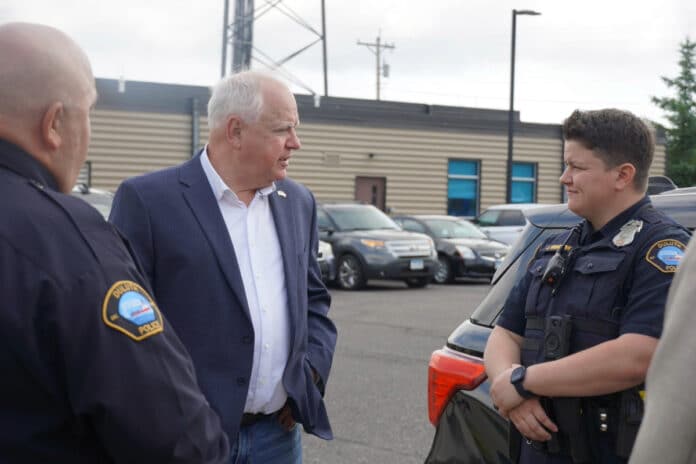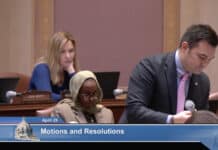
Two major associations representing police officers and law enforcement leaders have expressed serious concern to state officials and among their members this week over a new law they believe will negatively impact how and when school resource officers can restrain students involved in physically violent altercations.
On Monday the Minnesota Chiefs of Police Association sent a letter to Gov. Tim Walz asking his office to “provide an immediate response that will provide clarity to police chiefs about the law change regarding [school resource officers’] abilities to keep the children and staff safe.”
The new law, the organization says, restricts a school resource officer “from separating those involved in the fight or altercation, safely holding them on the floor while trying to calm them down.”
Language containing the changes in the law that now prohibits “prone restraint and certain physical holds” was inserted this spring as a provision to an omnibus education finance and policy bill that Gov. Walz signed in May. The changes to existing law that governs use of physical restraint on pupils in schools went into effect on Aug. 1.
The MCPA contends the changes to the law will prevent a school resource officer from safely intervening in situations that involve physical altercations between students or students and staff members at a school.
“Often responding alone, the SROs quickly respond and attempt to de-escalate the situation,” Jeff Potts, executive director for the MCPA, wrote in the letter to Walz. “This work frequently requires the SRO to physically intervene to stop students from fighting. Prohibiting the most basic measure of safely restraining and controlling the aggressor in a fight severely impacts the SRO’s ability to intervene, stop the altercation, and protect everyone’s safety.”
Potts also told Walz that the police chiefs across the state are frustrated the public safety community “was never invited to provide input, perspective, or feedback on the unintended consequences of this significant law change. In fact, we learned of the changes after you had already signed them into law.”
Walz responds to letter during press conference
During a press conference in St. Paul on Wednesday, Gov. Walz confirmed he had received the letter from the MCPA and was working with his legal team to answer the organization’s concerns. The press conference was planned to focus on the rollout of tax rebate checks being sent to Minnesotans who qualify. But Walz fielded a few off-topic questions, including one about the MCPA letter.
“We will clarify the law,” Walz told reporters, who added that as a former teacher he’s been very supportive of the work of SROs in schools. “I asked my team to read me the law with the interpretation of the attorneys down there; and there is health and safety exceptions for students and the officers, just like there is in everything.”
Walz said the law was written to prohibit restraints “like choke holds, neck holds on students.”
“I certainly think we should all agree that we should not kneel on the necks of students unless someone’s life is at risk; and that is written into the law to be able to do that,” Walz said.
Law enforcement officers seeking clarity before school year begins
On Wednesday, the Minnesota Police and Peace Officers Association sent a letter to its members advising them of the ambiguity in the changes to the law on restraints in schools.
“If a member has any concerns regarding the applicability of the law, they should consider SRO assignments or any contracted work as an agent of the school district until more clarity is provided,” wrote attorney Imran S. Ali, who serves as general counsel to the MPPOA. “Until then, as your general counsel, I have significant concerns for our members to work in any capacity as an SRO or any work contracted through a school district.”
School districts that utilize school resource officers commonly contract the services of a law enforcement officer employed by a local police department or county sheriff’s office.
Jeff Potts of the MCPA stressed the timing of the governor’s office clarifying the law for SROs with schools about to resume in the coming weeks.
“While an SRO program has many benefits, the ultimate goal is keeping the nearly 900,000 students and staff members inside schools across our state safe. We implore you to use whatever powers you have to address this situation.”
Hank Long
Hank Long is a journalism and communications professional whose writing career includes coverage of the Minnesota legislature, city and county governments and the commercial real estate industry. Hank received his undergraduate degree at the University of Minnesota, where he studied journalism, and his law degree at the University of St. Thomas. The Minnesota native lives in the Twin Cities with his wife and four children. His dream is to be around when the Vikings win the Super Bowl.














